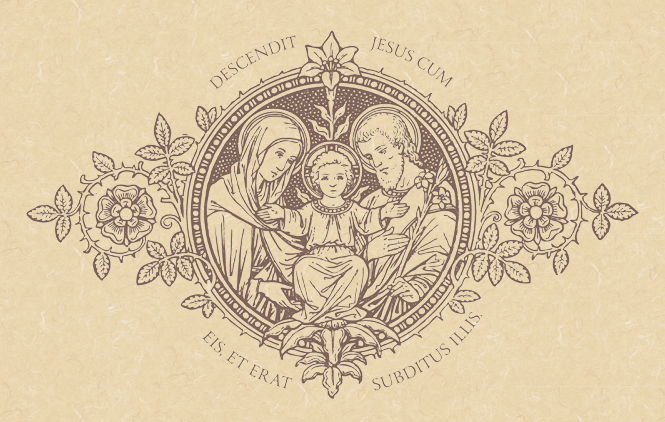Let's Get Some Sawdust on the Floor.
The Sunday within the Octave of the Nativity: the Feast of the Holy Family.
Lessons from the tertiary dominica,* according to the ordinary form of the Roman Rite:
• Sirach 3: 2-6, 12-14; or, I Samuel 1: 20-22, 24-28.
• Psalm 128: 1-5; or, 84: 2-3, 5-6, 9-10.
• Colossians 3: 12-21 or 12-17; or, I John 3: 1-2, 21-24.
• Luke 2: 41-52.
The Sunday within the Octave of the Nativity; and, the Commemoration of Saint John, Apostle & Evangelist.**
Lessons from the dominica, according to the extraordinary form of the Roman Rite:
• Galatians 4: 1-7.
• Psalm 44: 3, 2.
• Luke 2: 33-40.
The Sunday after the Nativity: of the Memory of the Holy & Just Joseph, Husband of Mary; of David, Prophet & King; and, of the Holy Apostle James, Brother of the Lord; and, the Feast of the Holy Apostle, First Martyr & Archdeacon Stephen.***
First & third lessons from the pentecostarion, second & fourth from the menaion, according to the Ruthenian recension of the Byzantine Rite:
• Galatians 1: 11-19.
• Acts 6: 8—7: 5, 47-60.
• Matthew 2: 13-23.
• Matthew 21: 33-42.
FatherVenditti.com
|
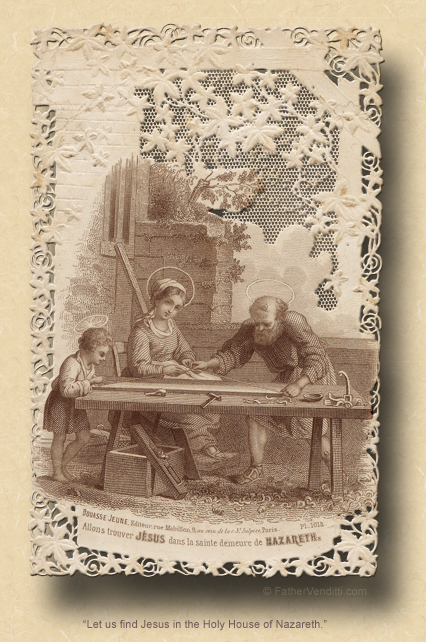 8:47 AM 12/27/2015 — Pope Blessed Paul VI once said that “The home of Nazareth is the school where we begin to understand the life of Jesus—the school of the Gospel” (Paul VI at Nazareth, 5 January 1964). But the first lesson we learn at that school is a lesson on silence. The whole of the Old Testament foretells our Lord's coming. The Holy Gospels relate to us the Annunciation, the Visitation, the birth and preparation of the Baptist, the birth of our Blessed Lord Himself, His circumcision and presentation in the temple, and then … silence. Silence until the Baptist, busy at preaching repentance and baptizing, spies a young man in His early thirties walking toward him and proclaims: “Behold, the Lamb of God, who takes away the sin of the world” (John 1: 29 NABRE). 8:47 AM 12/27/2015 — Pope Blessed Paul VI once said that “The home of Nazareth is the school where we begin to understand the life of Jesus—the school of the Gospel” (Paul VI at Nazareth, 5 January 1964). But the first lesson we learn at that school is a lesson on silence. The whole of the Old Testament foretells our Lord's coming. The Holy Gospels relate to us the Annunciation, the Visitation, the birth and preparation of the Baptist, the birth of our Blessed Lord Himself, His circumcision and presentation in the temple, and then … silence. Silence until the Baptist, busy at preaching repentance and baptizing, spies a young man in His early thirties walking toward him and proclaims: “Behold, the Lamb of God, who takes away the sin of the world” (John 1: 29 NABRE).
We want to suppose that part of the book has been ripped out, a reel of the movie missing. Where are the cutesie-pie stories of our Lord's childhood? Where do we see Him walking upright for the first time, speaking His first words, learning to read, learning the rudiments of His father's carpenter's trade? But, when you think about it, these are the parts of all our lives that are usually the silent ones. When you're preparing to apply for a new job and you start to put together a resume, you never include in it: “I was potty-trained on March 4th, 1964.” You don't imagine that your prospective employer wants to know that. If he does, you should consider applying someplace else.
But we're not talking here about the biography of some ordinary person; we're talking about the life of our Lord, God and Savior, Jesus Christ, and we want to know everything. After all, everything our Blessed Lord says and does is a lesson for us, pointing for us the way to heaven; but, a significant chunk of our Lord's life has been denied to us; most of it, in fact. Our Lord begins His public ministry at the age of thirty, and goes to His cross at the age of thirty-three. Everything and anything that happened before then is missing … everything except one event, when our Lord was twelve years old, the only event that breaks the silence of the Gospels about the hidden years of Jesus (cf. Catechism of the Catholic Church, 534).
Our Blessed Mother and the Holy and Just Joseph were both devout Jews, and Nazareth was not so far from Jerusalem, so there was no reason they couldn't go each year to celebrate the Passover; and so the Gospels tell us this was their custom. They went, in fact, with a group, in much the same way that folks from some parish in Jersey City or New York or somewhere in Connecticut will pile into a bus and come here once a year to visit our Shrine. So, the Holy Family makes the journey to Jerusalem each year amidst a whole caravan of friends and neighbors. Everyone knows each other, the children all play together, the mothers all trade meatloaf recipes, the fathers are all in the same bowling league and watch Monday Night Football together; so, it's perfectly understandable that, when they all get on the bus to go home, our Blessed Mother and our Lord's Foster Father don't have Him on a leash, and presume He's somewhere in the group, sitting on the bus with the other kids His own age.
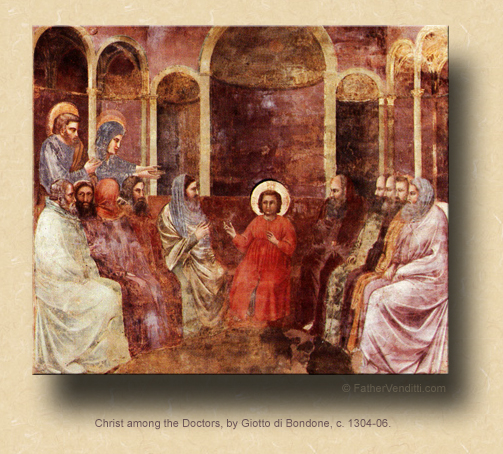 But even the Mother of God is still a mother like every other; and, after a day's journey, She wants to know where Her Son is. What's He doing? What kind of trouble is He into? Only She can't find Him; and, when the bus stops at Wawa to gas up and let everyone off to use the facilities, She and Her Husband hightail it back to Jerusalem to look for Him. But even the Mother of God is still a mother like every other; and, after a day's journey, She wants to know where Her Son is. What's He doing? What kind of trouble is He into? Only She can't find Him; and, when the bus stops at Wawa to gas up and let everyone off to use the facilities, She and Her Husband hightail it back to Jerusalem to look for Him.
They find Him, of course, and our Blessed Mother is none too pleased with Him: “Son, why have you done this to us? Your father and I have been looking for you with great anxiety” (Luke 2: 48 NABRE). I have a feeling that's the sanitized version. And the rest of the story we know: the Temple elders impressed with our Lord's maturity and knowledge of the Scriptures,—which He learned from His parents, of course—and the mysterious response He gives to His parents about being about his Father's business. Neither Mary nor Joseph understood what that meant at the time.
An interesting question raised by this whole episode, which we never seem to ask ourselves, is: where did Saint Luke get this information? He won't meet Jesus until our Lord is thirty years old. And those of you here every day will remember, from the last Saturday of Advent (cf. 12/19/2015), that Luke isn't from Palestine: he's a Greek from Antioch, so there's no chance he would have known anyone of our Lord's family or friends growing up, and he doesn't write his Gospel until he meets Saint Paul around the year 44. How does he know about something that happened when our Lord was twelve years old? None of the other Gospels have anything to say about our Lord's childhood: Matthew, Mark, John are all silent about this event. I like to think that he learned about it from our Lord's Mother. Our Gospel lesson today does say: “…his mother kept all these things in her heart” (2: 51 NABRE). How would Luke even know that unless She, Herself, had told him?
It is, of course, part of our spiritual tradition to look at the Holy Family of Nazareth with profound reverence: we idolize them, we look to them as the model of all families. That can either inspire us or make us feel deprived, depending on what our own family history is like. 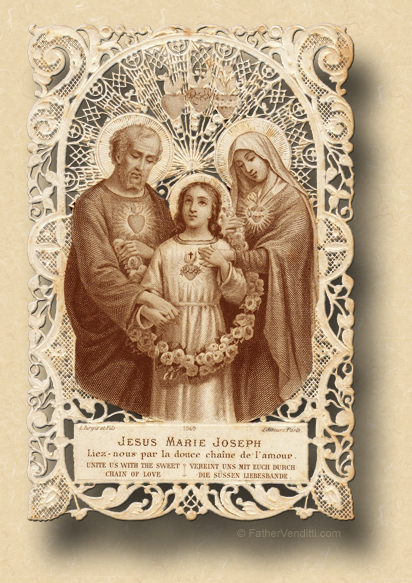 But the lesson should not be lost on us that, as special as the Holy Family of Nazareth was—a Mother conceived without sin, a Father completely disposed to the will of God, a Son Who is God—it was still, in many more ways than we tend to think, a very normal family. The episode that the Blessed Evangelist reports for us today, however he may have learned of it, proves that. And it takes us back again to the last week of Advent, wherein we were given to read of our Lord's Foster Father and how he came to receive his commission from an angel (cf. 12/18/2015): But the lesson should not be lost on us that, as special as the Holy Family of Nazareth was—a Mother conceived without sin, a Father completely disposed to the will of God, a Son Who is God—it was still, in many more ways than we tend to think, a very normal family. The episode that the Blessed Evangelist reports for us today, however he may have learned of it, proves that. And it takes us back again to the last week of Advent, wherein we were given to read of our Lord's Foster Father and how he came to receive his commission from an angel (cf. 12/18/2015):
When God decided to redeem man and come to earth, I suppose He could have done it anyway he wanted. He could have just appeared, fully grown. If He had wanted to be a bit more dramatic, he could have arrived the way Elijah departed this world, on a fiery chariot. But instead He chose to be born as other men are born: to a human mother, in a real family. That choice was deliberate. It wasn't an accident. He didn't have to do it that way, but the first thing that the God-man blessed with His presence on earth was a home.
Everything that's worth something in this life costs a little pain. And in this sense, there's nothing more expensive than love. It's impossible to love without risking some hurt; but, is it better, therefore, not to love? When couples live together without benefit of marriage, as so many do these days, they will often defend their actions saying, "It's better than getting hurt. What if it doesn't work out?" But there's something noble in the risk. It's that willingness to take the risk of pain that says to the other person, "I am loved." Maybe that's the reason that couples who live together before marriage often don't stay together, even after they're married.
There is nothing in this life more risky and more able to cause us pain than our own families. But is there even one among us who would be willing to get rid of them? They give us security, they teach our children virtue, they are the very foundation on which civilization is based. And sometimes they hurt us. Maybe that's why they're in danger. The family is threatened by a movement bent on completely redefining it. Men pretending to marry men, women pretending to marry women, then suing Catholic adoption agencies for not giving them children. Maybe the reason so many people are willing to tolerate these things is because they've been hurt too many times. The solid family, based on a monogamous marriage, is a risky business.
But was it less risky for the Holy Family of Nazareth? Mary's family didn't believe that She was pregnant by the Holy Spirit. Who would? Would you have? And Joseph's family couldn't believe their eyes when he married Her anyway. And there was no conjugal love between the two, as the Church teaches that She remained a virgin all Her life. That's enough of a strain on any marriage.
It is a sad fact of life that it hurts sometimes to live in a family. And families that are resolved to stay together often find themselves very much like sheep among wolves, very much like the Seventy Disciples whom our Lord sent out in one of the Gospel lessons we'll read sometime after Christmas. When, at the beginning of that passage, our Lord says that the harvest is plentiful but the laborers are few, many people just assume he's talking about the Holy Priesthood. But this event in the life of our Lord occurs long before Jesus chooses His twelve apostles. These men He sends out to preach the kingdom are laymen. We can presume that many of them had families. 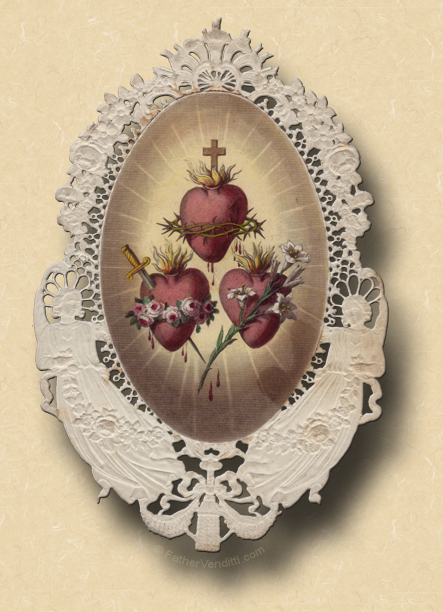 And our Lord charges them not to be concerned with how they're going to survive on their mission, but to be confident that God will provide. The decision to marry and start a family is a courageous one, trivialized by those who marry but who don't start families which is essentially an act of cowardice. And our Lord charges them not to be concerned with how they're going to survive on their mission, but to be confident that God will provide. The decision to marry and start a family is a courageous one, trivialized by those who marry but who don't start families which is essentially an act of cowardice.
From baptism onward every Christian is called by Christ to perform a mission. For those who have embraced the covenant of marriage, that mission lies in the raising of children in the faith. Maybe they feel ready for the burdens of family life and maybe they don't; but, ready or not they have accepted the call. They are like the Seventy which the Lord sent forth, not concerned about purse or bag or sandals, or what they were to eat or where they were to stay. Those seventy knew only that Christ had given them a mission, and nothing was going to prevent them from fulfilling it. They were prepared to sacrifice everything for him.
Today, our Holy Door was opened. The special graces and blessings available during this Extraordinary Jubilee Year of Mercy are ours for the taking. All we have to do to receive them is confess our sins to a priest, receive Holy Communion while in the State of Grace, and pray for our Holy Father the Pope; then, having prepared ourselves in this way, we can pass through the Holy Door and receive what the Church, from the 13th Century on, has called a “plenary indulgence,” releasing our souls from any obligation of purgatory we may have accumulated. Some have already asked how close together those three conditions need to be before we pass through the Holy Door. “I went to confession last month, I'm receiving Holy Communion today, and I can say a Hail Mary for the Pope right now; so, can I walk through the door?” But I must caution you not to view this frivolously. There is no set time frame in which all these things must happen; but, having been to confession, made a worthy Communion and prayed for the Pope, you must not be conscious of even a venial sin when passing through the door. For most of us, that will probably mean that we should confess, receive and pray the same day we plan to walk through the door, but that's up to you to decide. In any case, the making of a good and complete confession is obviously important. “I stole a pencil from work, missed Mass on a Holy Day and watched a dirty movie on my computer” isn't going to cut the mustard. You've got to confess everything, and therefore you need to know what must be confessed, which is why—and this is the third time, now—I have an examination of conscience here which you can take home with you to help you prepare properly.
Pray to the Holy Family of Nazareth. Take courage from how normal a family they were. Take inspiration from how Holy they were. But pray to them. Make them the personal patrons of your own family. When your family is in turmoil, when everyone's fighting with each other and not speaking to each other and hurling verbal and emotional abuse on each other, as all families do at one time or another, pray to the Holy Family. Ask them for the grace to help make your home into the carpenter shop at Nazareth.

* On this day, the first through the third lessons (including the psalm) are constant, with the fourth lesson from the Gospel being variable according to the current dominical cycle; however, alternate lessons are provided according to the current dominical cycle which may be used at the discretion of the priest.
** In the extraordinary form, the Sunday within the Octave does not carry the title of the Holy Family, that feast being observed on the Sunday after Epiphany.
The Feast of the Apostle & Evangelist John, ordinarily a feast of the Second Class, becomes a commemoration when falling on this Sunday.
*** All the typicons of the Byzantine Churches observe Saint Stephen's Day on the 27th, though it is interesting to note that the Kontakion of the feast sung prior to the lessons at Divine Liturgy clearly makes reference to Christ being born "yesterday"; thus, the Feast of Saint Stephen must have been observed on the 26th at one time, as it still is in the West. Most likely, it was moved to make way for the Synaxis of the Mother of God on the 26th, a feast that was transfered in the Latin Church to January 1st, displacing the old Feast of the Circumcision (which is still observed in the East on that day).
|
